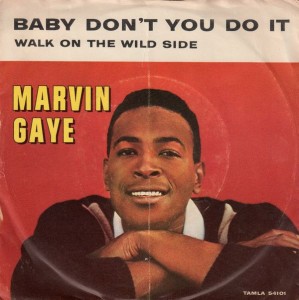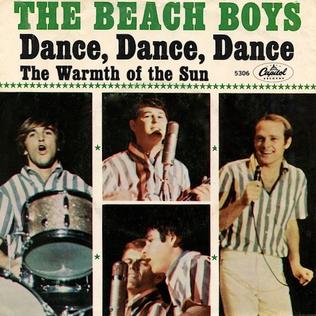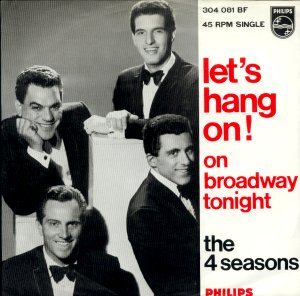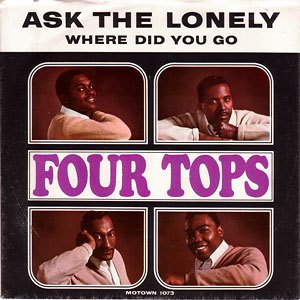Related Research Articles

"Baby Love" is a song by American music group the Supremes from their second studio album, Where Did Our Love Go. It was written and produced by Motown's main production team Holland–Dozier–Holland and was released on September 17, 1964.

"Come See About Me" is a 1964 song recorded by the Supremes for the Motown label. The track opens with a fade-in, marking one of the first times the technique had been used on a studio recording.

"Baby Don't You Do It" is a 1964 single by American singer Marvin Gaye. Released on the Tamla label, this song discusses a man who is at a standstill with his girlfriend, who he feels is neglecting his love stating "Don't break my heart/...I've tried to do my best".

"Dance, Dance, Dance" is a song by the American rock band the Beach Boys from their 1965 album Beach Boys Today!. Written by Brian Wilson, Carl Wilson, and Mike Love, it was first issued as a single in October 1964, backed with "The Warmth of the Sun". "Dance, Dance, Dance" marked Carl's first recognized writing contribution to a Beach Boys single, his contribution being the song's primary guitar riff and solo.

"Do Wah Diddy Diddy" is a song written by Jeff Barry and Ellie Greenwich and originally recorded in 1963, as "Do-Wah-Diddy", by the American vocal group the Exciters. Cash Box described the Exciters' version as "a sparkling rocker that bubbles over with coin-catching enthusiasm" and said that the "great lead job is backed by a fabulous instrumental arrangement." It was made internationally famous by the British band Manfred Mann.

"Walk Like a Man" is a song written by Bob Crewe and Bob Gaudio and originally recorded by rock band the Four Seasons.

"Rag Doll" is a popular song written by Bob Crewe and Bob Gaudio. It was recorded by the Four Seasons and released as a single in 1964.
"Wishin' and Hopin'" is a song, written by Hal David and Burt Bacharach, which was a Top 10 hit for Dusty Springfield in 1964.
"Dawn " is a song written by Bob Gaudio and Sandy Linzer and recorded by The Four Seasons in November 1963. The song hit No. 3 in the early part of 1964. According to Billboard, it was the 25th biggest hit single of the year, placing behind "Rag Doll", another Four Seasons hit, which was No. 24.
"Save It for Me" is a song written by Bob Gaudio and Bob Crewe. A song recorded in 1964 by The Four Seasons for their Rag Doll album, it was released as the follow-up record to the album's title song, which had hit the #1 position on the Billboard Hot 100 singles chart in July 1964. "Save It for Me" was also a success for the quartet, reaching the #10 position on the Billboard singles chart.

"Let's Hang On!" is a song composed by Bob Crewe, Sandy Linzer, and Denny Randell that was popularized by The Four Seasons in 1965. The single reached the No. 3 position in the Billboard Hot 100 singles chart, the group's highest placement since "Rag Doll" hit the top spot in July 1964.
"New Mexican Rose" is a song by the American rock band The Four Seasons. The song was composed by producer Bob Crewe and arranger Charles Calello. While sales did not match that of the singles' predecessors, "New Mexican Rose" did make it into the Top 40 of Billboard's Hot 100 singles chart, reaching a peak position of #36 in November 1963.

"Tell Me " is a song by the English rock band the Rolling Stones, featured on their 1964 self-titled album. It became the first A-side single written by Jagger/Richards to be released, although not in the United Kingdom. The single reached number 24 in the United States and the top 40 in several other countries.

"When the Lovelight Starts Shining Through His Eyes" is a song written by Holland–Dozier–Holland and recorded in 1963 by Motown singing group The Supremes. It is notable as the Supremes' first Billboard Hot 100 Top 40 recording, following seven previous singles between January 1961 and September 1963 which failed to enter the Top 40. The single is also notable as the first Supremes single written and produced by Holland–Dozier–Holland, who had previously created hits for Martha and the Vandellas and Mary Wells.
"Run, Run, Run" is a 1964 song written by Holland–Dozier–Holland and released as a single by Motown singing group The Supremes. After a couple of years of unsuccessful singles, the Supremes had finally broken through with a Top 40 single (23) in December 1963 with "When the Lovelight Starts Shining Through His Eyes". On the heels of its release, Motown rush-released a second HDH single titled "Run, Run, Run". Inspired by the sounds of Phil Spector and his Wall of Sound, it was an attempt to give the Supremes a poppier sound compared to their earlier heavy R&B recordings. Billboard described the song as a "strong follow up" to "When the Lovelight Starts Shining Through His Eyes," stating that it "has tough beat in a middle up groove that's great for dancing." Cash Box described it as "a pulsating, big sounding rocker with some torrid triplet keyboard work backing up."

"Ask the Lonely" is a soul/pop ballad recorded by Motown singing group the Four Tops. Released as the group's third single, the single became the group's second successful single since signing with Motown in 1963. Released in 1965, the song rose to no. 24 on the pop chart and no. 9 on the R&B one. It is notable for being co-written by longtime Motown staffer Mickey Stevenson, as most of the group's hits on Motown were written and produced by Holland-Dozier-Holland. Levi Stubbs sang the lead, with The Andantes joining the other Tops on the background vocals. The music was performed by The Funk Brothers and the Detroit Symphony Orchestra provided the instrumentation.
"I Like It Like That" was a 1964 hit song by Motown group The Miracles on its Tamla label subsidiary. This is not the Chris Kenner hit song of the same name but, rather, a Miracles original, written by Miracles members Smokey Robinson and Marv Tarplin, and is included on the group's first greatest hits album, Greatest Hits from the Beginning. It was also the title song from their long-since deleted 1964 album of the same name.

"Where Did Our Love Go" is a 1964 song recorded by American music group the Supremes for the Motown label.

"Because" is a song recorded by English rock band The Dave Clark Five from their third studio album American Tour (1964). Written by Dave Clark and singer Mike Smith, and produced by Adrian Clark, the song was originally the B-side to "Can't You See That She's Mine" in the UK.

"Do I Love You?" is a song written by Phil Spector, Pete Andreoli and Vini Poncia. It was recorded by American girl group the Ronettes in 1964 and released on their debut album Presenting the Fabulous Ronettes.
References
- ↑ Unterberger, Richie. "The Four Seasons Biography". AllMusic. Retrieved 2022-08-23.
- ↑ Whitburn, Joel (2004). The Billboard Book of Top 40 Hits: Eighth Edition. Record Research. p. 238.
- ↑ "Singles Reviews" (PDF). Billboard. October 31, 1964. p. 16. Retrieved 2021-04-02.
- ↑ "CashBox Record Reviews" (PDF). Cash Box. October 31, 1964. p. 8. Retrieved 2022-01-12.